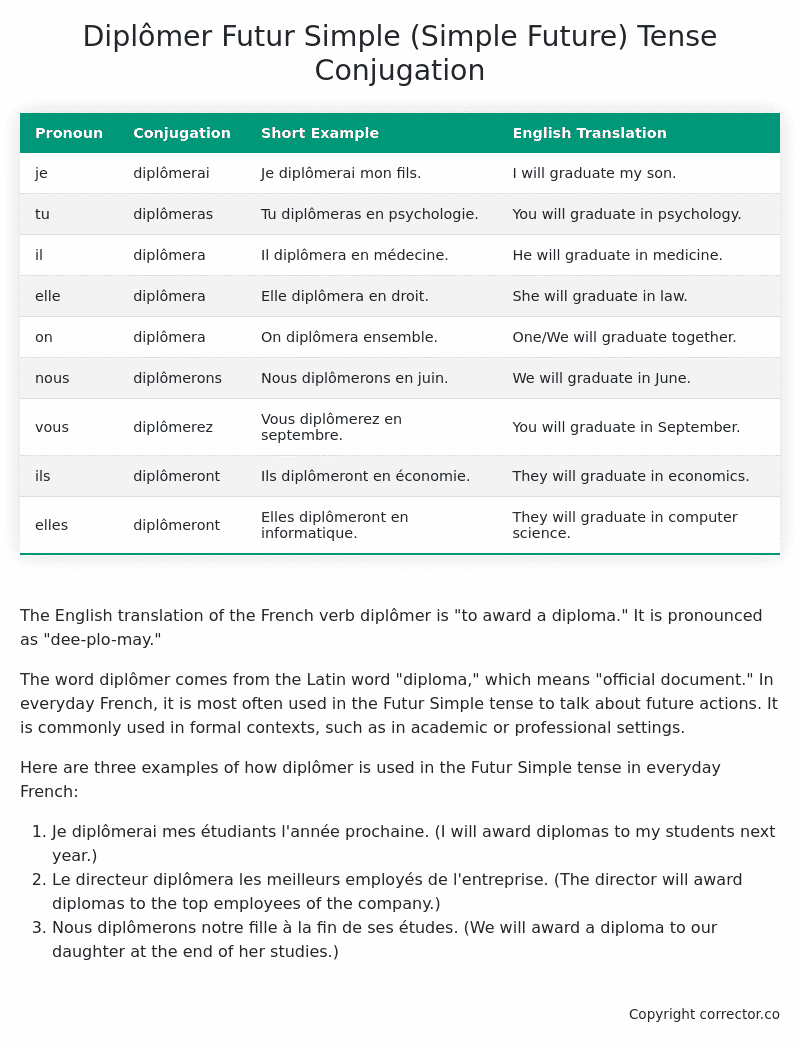Futur Simple (Simple Future) Tense Conjugation of the French Verb diplômer
Introduction to the verb diplômer
The English translation of the French verb diplômer is “to award a diploma.” It is pronounced as “dee-plo-may.”
The word diplômer comes from the Latin word “diploma,” which means “official document.” In everyday French, it is most often used in the Futur Simple tense to talk about future actions. It is commonly used in formal contexts, such as in academic or professional settings.
Here are three examples of how diplômer is used in the Futur Simple tense in everyday French:
- Je diplômerai mes étudiants l’année prochaine. (I will award diplomas to my students next year.)
- Le directeur diplômera les meilleurs employés de l’entreprise. (The director will award diplomas to the top employees of the company.)
- Nous diplômerons notre fille à la fin de ses études. (We will award a diploma to our daughter at the end of her studies.)
Table of the Futur Simple (Simple Future) Tense Conjugation of diplômer
| Pronoun | Conjugation | Short Example | English Translation |
|---|---|---|---|
| je | diplômerai | Je diplômerai mon fils. | I will graduate my son. |
| tu | diplômeras | Tu diplômeras en psychologie. | You will graduate in psychology. |
| il | diplômera | Il diplômera en médecine. | He will graduate in medicine. |
| elle | diplômera | Elle diplômera en droit. | She will graduate in law. |
| on | diplômera | On diplômera ensemble. | One/We will graduate together. |
| nous | diplômerons | Nous diplômerons en juin. | We will graduate in June. |
| vous | diplômerez | Vous diplômerez en septembre. | You will graduate in September. |
| ils | diplômeront | Ils diplômeront en économie. | They will graduate in economics. |
| elles | diplômeront | Elles diplômeront en informatique. | They will graduate in computer science. |
Other Conjugations for Diplômer.
Le Present (Present Tense) Conjugation of the French Verb diplômer
Imparfait (Imperfect) Tense Conjugation of the French Verb diplômer
Passé Simple (Simple Past) Tense Conjugation of the French Verb diplômer
Passé Composé (Present Perfect) Tense Conjugation of the French Verb diplômer
Futur Simple (Simple Future) Tense Conjugation of the French Verb diplômer (this article)
Futur Proche (Near Future) Tense Conjugation of the French Verb diplômer
Plus-que-parfait (Pluperfect) Tense Conjugation of the French Verb diplômer
Passé Antérieur (Past Anterior) Tense Conjugation of the French Verb diplômer
Futur Antérieur (Future Anterior) Tense Conjugation of the French Verb diplômer
Subjonctif Présent (Subjunctive Present) Tense Conjugation of the French Verb diplômer
Subjonctif Passé (Subjunctive Past) Tense Conjugation of the French Verb diplômer
Subjonctif Imparfait (Subjunctive Imperfect) Tense Conjugation of the French Verb diplômer
Subjonctif Plus-que-parfait (Subjunctive Pluperfect) Tense Conjugation of the French Verb diplômer
Conditionnel Présent (Conditional Present) Tense Conjugation of the French Verb diplômer
Conditionnel Passé (Conditional Past) Tense Conjugation of the French Verb diplômer
L’impératif Présent (Imperative Present) Tense Conjugation of the French Verb diplômer
L’infinitif Présent (Infinitive Present) Tense Conjugation of the French Verb diplômer
Struggling with French verbs or the language in general? Why not use our free French Grammar Checker – no registration required!
Get a FREE Download Study Sheet of this Conjugation 🔥
Simply right click the image below, click “save image” and get your free reference for the diplômer Futur Simple tense conjugation!

Diplômer – About the French Futur Simple (Simple Future) Tense
Formation of Futur Simple
For regular -er verbs (e.g., parler – to speak)
For regular -ir verbs (e.g., finir – to finish)
For regular -re verbs (e.g., vendre – to sell)
Common Everyday Usage Patterns
Conditional Statements
Interactions with Other Tenses
Futur Antérieur
Conditional
Present
Summary
I hope you enjoyed this article on the verb diplômer. Still in a learning mood? Check out another TOTALLY random French verb conjugation!


